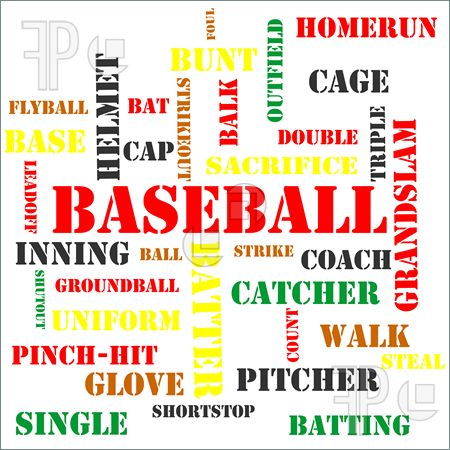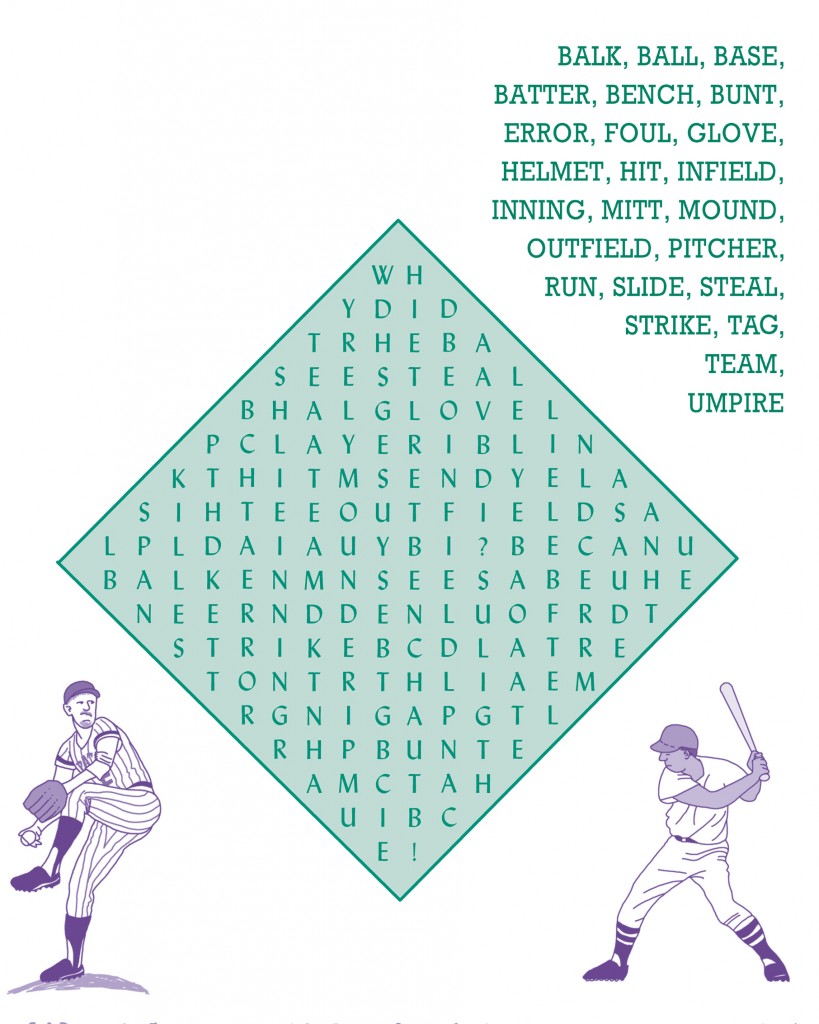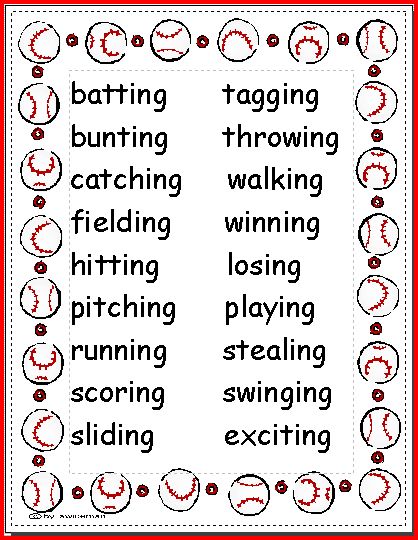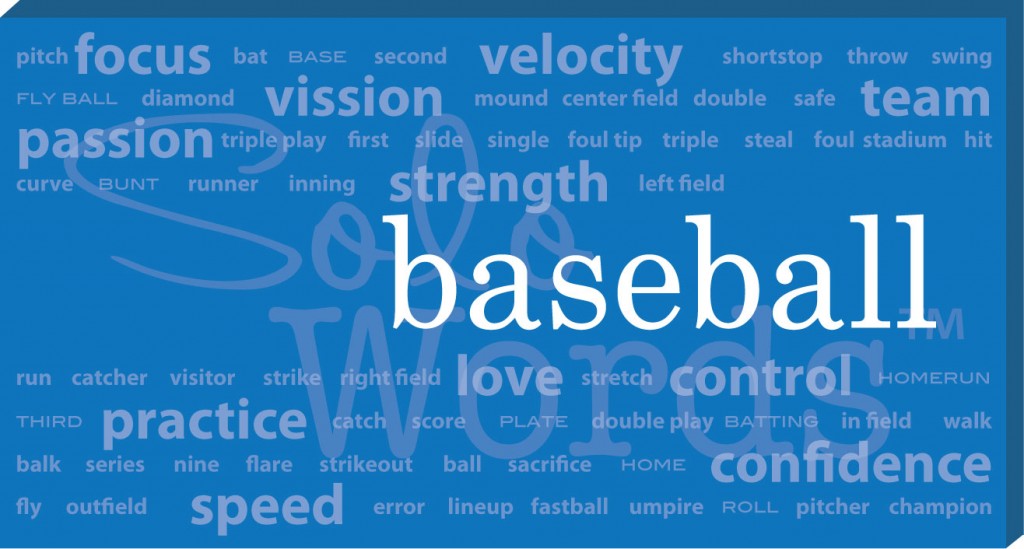Complete List of Baseball Terms
Over the years, baseball has developed its own rich language, including terms that that have slipped into our everyday lexicon.
But some of baseball’s more obscure terms can be confusing for a beginning fan. We’ve completed a complete glossary of baseball terminology below. It’s in alphabetical order so the next time your wonder what the play-by-play man is means when he mentions a “Punch and Judy” hitter, you can just refer to our handy-dandy list.
4-bagger — a home run.
5-tool player — a player who can run, field throw, hit for average and hit for power.
ace – a team’s top starting pitcher.
ahead in the count — the batter or pitcher who has the advantage in balls or strikes during an at-bat.
airmail — an errant throw that sails over its intended target .
alabaster blast — a ground ball that hits home plate (or around home plate) and takes a big hop over the infielders.
alley– the gap between the center fielder and the corner outfielders
around the horn– when a double play goes from third base to second to first.
aspirin pill — a hard to hit fastball.
ate him up — a difficult to field ball.
backdoor slider — a breaking pitch that swings into the strike zone at the last moment.
bad-ball hitter — a batter who excels at hitting pitches out of the strike zone.
bag — a base.
Baltimore chop — a ground ball that hits home plate (or around home plate) and takes a big hop over the infielders.
banjo hitter — a batter who lacks power.
bandbox– A ballpark with smaller dimensions or that plays small.
bang-bang play — A play in which the runner reaches the bag a split-second before the ball arrives or vice versa.
bare hand it — when a fielder uses his bare hand rather than his glove.
base knock — base hit.
baseball Annie — female baseball groupie.
bases loaded — runner on every base.
basement — last place.
basket catch — When a fielder catches a ball with an open glove near his belt level.
batter’s eye — a dark, crowdless area beyond the centerfield wall that acts as a visual backdrop for a the batter.
BB — a line drive.
behind in the count — opposite of ahead in the count.
bench jockey — a player, coach or manager who tries to annoy the umpire or their opponent from the dugout.
bender — curve ball.
big fly — home run
bigs — the Major League.
bleeder — a dribbler that gets through the infield
blistered — hard hit ball
booted — make an error
break one off — curveball
Bronx cheer — booing.
brushback — A pitch that nearly hits a batter with the intent to intimidate or send a message.
bush league — an amateur play or behavior.
businessman special — day baseball during the week
butcher — a bad fielder
butcher boy — when a batter fakes a bunt and then tries to chop it over the drawn in infield
can of corn — an easy to catch flyball to the outfield
caught looking — when a batter is called out on strikes.
caught napping — when a base runner is tagged out because he wasn’t paying attention.
cellar — last place.
cement mixer — a breaking ball that hangs in the strike zone
change the eye level — when a pitcher throws pitches at different heights in the strike zone
change up — a slower pitch made to look like a fastball out of the hand
charging the mound — when a batter runs at a pitcher after being hit or knocked down
check the runner — when a pitcher looks toward a runner on base.
cheder — a good fastball
cheese — a good fastball
chin music — a high and inside pitch that cases the batter to jerk his head.
circus catch — An outstanding catch by a fielder involving unusual contortions
clean hit — a base hit that isn’t touched by an infielder at all or an outfielder before it bounces.
clean up hitter — the fourth batter in the lineup
clear the bases — when a batter knocks in all the baserunners on base
closer — the relief pitcher who finishes the game when his team has the lead
clutch — a player who performs well in pressure situations.
comebacker — ground ball right back at the pitcher.
command — a pitcher’s ability to throw where we wants.
contact hitter — a hitter who rarely strikes out.
crooked number — an inning a team scores more than one run in.
crossed up — when a pitcher throws a different pitch than the catcher requested.
crowd the plate — a hitter he positions himself on the inside of the batter’s box.
cup of coffee — when a minor leaguer has a very brief stay in the major leagues.
curtain call — when a player comes forward from the dugout to salute the fans after a homerun.
cutter — a late breaking fastball.
cycle — When a batter hits a single, double, triple and home run in the same game.
daisy cutter — a hard ground ball.
dead arm — when a normally effective pitcher loses his ability for a period of time due to fatigue.
dead pull hitter — a hitter who almost always hits the ball to the side of the field he bats.
defensive indifference — when a baserunner is allowed to take a base by the defense.
deuce -- a curveball. (Generally when calling for a curve the catcher puts down two fingers.)
dinger — a home run.
ding dong — a home run.
dish — home plate.
double play — making two outs on the same play
double play depth — when the middle infielders play a little deeper and closer to second.
double switch — when a manager makes a pitching and fielding switch simultaneously, effectively changing the pitcher’s slot in the lineup.
double up — when a baserunner is the second out of a double play.
drag bunt – a bunt that you try to drag past the pitcher and record a base hit on.
ducks on the pond — bases loaded
dying quail — a blooper toward the outfield.
eephus pitch — a slow pitch with a softball like trajectory.
excuse me swing — when a batter inadvertently makes contact on a check swing.
extra out — when the defense makes an error, allowing an additional out
Fall Classic — World Series
fall off the table — a pitch that dives out of the strike zone
farm team — minor league affiliate
fat pitch — easy pitch to hit
fielder’s choice — when a fielder allows the runner to reach first so he can record another out
fireman — a team’s closer
first ball hitter — a batter who looks to swing at the first pitch of an at-bat.
fisted — when a batter fights off a pitch near his hands.
five-tool player — a player who can run, field throw, hit for average and hit for power.
flare — short flyball toward the outfield.
flashing the leather — a superlative defensive play.
flat track bully — a hitter who thrives off of poor pitchers.
fluke hit — a base hit due to luck rather than skill.
four bagger — homerun.
four-fingered salute — a walk.
four-seam fastball — a standard fastball without much break.
free baseball — extra innings
free pass — a walk
frozen rope — line drive
full count — three balls and two strikes to the hitter
fungo — a ball hit to a fielder during practice.
fungo bat — a lightweight bat used for fielding practice
gamer — a hard nosed player
gapper– a ball hit into the outfield gap
gap hitter — a batter who tends to use the outfield gaps
gas — fastball
gem — a well pitched game
get off the schnide — break out of a hitless slump.
go down in order — an inning in which no batter reaches base.
go yard — home run.
golden sombrero — when a batter strikes out four times in a game.
golfing — swinging at a low pitch.
gopher ball — a pitch hit for a home run.
got a piece of it — foul tip.
grand slam — homer with the bases loaded.
green light — when a manager allows a hitter to swing on a 3-0 or 3-1 count.
groove a pitch — a pitch down the middle of the plate.
guess hitter — a batter who doesn’t try to read the pitch in the air.
gun down — to throw out a baserunner.
handcuff — a groundball that jumps right up at a fielder.
heat — A good fastball.
help his own cause — when a pitcher produces at the plate.
hidden ball trick — when a fielder tags a runner out be pretended he doesn’t have the ball.
high and tight –a pitch that’s up in the strike zone and inside on a hitter
high cheese — high fastball
hill — pitcher’s mound.
hit the ball on the screws — make solid hard contact.
hold the runner on — when the first baseman plays close to the base to prevent a big baserunner lead.
hole in the lineup — a weak hitter
home half — the bottom of the inning
homer — a four base hit.
hook — when the manager leaves the dugout with the intention of replacing the pitcher
hose — strong outfield arm.
hot corner — Third base.
hot stove league — offseason gossip and trade rumors.
human rain delay — a pitcher who works slowly
humpback liner — a hit toward the deep infield/shallow outfield which is between a line drive and fly ball.
hurler — pitcher
inherited runner — a runner on base when a relief pitcher enters the game.
innings eater — a pitcher who goes deep into games.
inside baseball — baseball strategy
insurance run — a late inning run to pad a team’s lead.
interstate — a hitter with a batting average of under 195 (for 1-95.)
in the hole — The batter after the on-deck hitter.
jack — a home run.
jam -- when a pitcher is in trouble.
Junior Circuit — American League. (The younger league.)
junk — breaking pitchers as opposed to fastballs.
K — strikeout.
keep of the boards — don’t allow the other team to score.
keystone — second base.
knee-buckler — a breaking pitch with freezes the hitter.
lace — to hit a line drive.
laugher — a game that isn’t close.
launching pad — a ballpark conducive to home runs.
leather — in reference to a player’s glove or general defensive ability.
leg out — to run hard to beat out an infielder’s throw for a base hit.
lights out — a dominant pitching performance.
live arm — a pitcher with a big fastball.
long ball — home run.
LOOGY — a left-handed relief pitcher used to only face left handed hitters. (Lefty one out guy.)
loud out — an out that initially looked like it would be a hit.
lumber — baseball bat.
magic number — the number of wins or second place team loses a team need to clinch a division.
manufacturing runs — moving the running base by base — often using outs — before he scores.
masher — home run hitter.
meat — a rookie or an easy out.
Mendoza line — batting average of .200, named after light hitting infielder Mario Mendoza
men in blue — umpires
meatball — an easy pitch to hit.
middle infielders — the second baseman and shortstop
middle relief pitcher — a reliever brought in between the fourth and seventh inning.
mistake hitter — a hitter who thrives off of bad pitches.
moon shot — very high homerun. (Actually named after Wally Moon, who tended to hit them)
motor — a players ability to run fast.
mustard — a pitch with a little extra speed than usual.
nail down — when a relief pitcher closes out a game
nibble — when a pitcher tries to hit the extreme corners of the plate
Nintendo — to strike a batter out on three straight pitches.
no-decision — when a starting pitcher gets neither a win nor a loss.
no-hitter — when a starting pitcher completes the game without allowing any hits.
no-no — no hitter.
o-fer — when a hitter goes a game without getting a hit.
off-speed pitch — change up.
on-deck — the next batter up.
on his horse — running at full speed, usually in the field.
on the black — a pitch that just nicks the strike zone.
on the board — a team’s first run of the game.
on the screws — when a batter hits a hard line drive.
opposite field hit — a batted ball to the opposite field as the hitter’s natural swing.
out pitch — a pitcher’s best pitch.
parachute — a fly ball that seems to drop right down into a fielder’s glove.
paste — to hit a ball hard.
payoff pitch — a pitch thrown with a full count.
peg — a well thrown ball from the field.
pepper — pregame fielding exercise
perfect game — a complete game by the starting pitcher in which there are no baserunners.
phantom tag — when the umpire erroneously calls a baserunner out despite the fact he wasn’t tagged with the ball.
pick — a slick, clean fielding play on a difficult ball.
pickle — a rundown.
pill — the baseball.
pitch around — deliberately not throwing a hitter strikes.
pitch count — number of pitches a pitcher has thrown.
pitcher’s duel — low scoring game.
pitchout — throwing a wide intentional ball in hopes of catching a base runner stealing.
pivot man — when the second baseman pivots to turn a double play.
platoon — starting two different handed batters at the same position depending on the opposing pitcher.
playing in — when the infielders move in in anticipation of a bunt or to keep a runner at third base.
plunked — hit by pitch.
poke — a solidly struck base hit.
power hitter — hitter with home run abilities.
productive out — an out that advances a baserunner
Punch and Judy hitter — a hitter without much power
punch out — a strikeout.
purpose pitch — an inside pitch with the intention of moving a batter off of the plate.
quality start — when a pitcher goes at least 6 innings and gives up three or fewer runs.
quick pitch — when pitcher releases the ball faster than usual to deceive the batter.
quiet bats — an offense which isn’t producing hits.
rabbit ears — a baseball player who responds negatively to bench jockeying.
rainbow — high arcing curveball.
rake — to hit the ball hard to all parts of the field.
rally — a late inning comeback.
rally cap — a baseball hat worn in comical way (often inside out) to encourage a rally.
range — a fielder’s ability to cover ground.
relay throw — when an infielder takes a throw from an outfielder and then throws it to a base.
replacement level player — a player of common skills that can be obtained at minimal price
rhubarb — a fight or scuffle.
ribbie — an RBI.
room service — an easy ball hit right at a fielder.
rope — line drive.
rubber arm — a pitcher who can pitch lots of innings without tiring.
rubber game — the deciding game of a series.
run-down — when a baserunner gets caught between bases by the fielders.
Ruthian — a great display of power
sabermetrics — analysis of baseball through statistics.
sack — the base.
safety squeeze — a bat with a man on third in which the runner doesn’t run on contact.
salami — ground slam.
seed — a hard hit ball with little arc.
seeing-eye single — a soft ground ball that barely alludes the infielders for a base hit.
Senior Circuit — National League
sent down — when a player is demoted to the minor leagues.
sent to the showers — when a pitcher is removed from the game due to ineffectiveness.
set the table — get on base in from of a power hitter.
set-up man — a relief pitcher who enters the game in the 7th or 8th inning with the lead
seventh-inning stretch — period between the top and bottom of the seventh when fans are encouraged to stretch their legs.
shagging flies — pregame outfield practice
shoestring catch — a running catch made just above the fielder’s shoes.
short porch — a fence that is closer to home plate than normal
show bunt — when a hitter indicates he is going to bunt by bat positioning.
shutout — when a team scores no runs during a game.
slap hitter — a hitter who tries to control the ball, rather than drive it.
slugfest — a high scoring game.
slurve — a cross between a curve ball and a slider.
smallball — an offensive strategy involving moving runners from base to base, often employing tactical outs.
snowcone — a catch made with a portion of the ball outside the glove’s webbing
southpaw — a left-handed pitcher.
spike –when a runner injures a fielder with the spikes on his shoes.
spitter — a pitched ball that has been illegal altered with spit or other lubrication.
splits — a player’s performance broken down into categories such as home and away or vs. right handers and vs. left handers.
spot starter — a starting pitcher announced on short notice, often due to injury.
squeeze play — a bunt which attempts to score a runner from third base.
stand up double — when a hitter reaches second on a batted ball without having to slide. (Also, stand up triple.)
stanza — inning
stepping the bucket — an open batting stance.
stopper — the team’s best starting pitcher.
stuff — the totality of a pitcher’s skills
submarine — a pitcher who throws sidearm.
subway series — when two team’s from the same city play
suicide squeeze — a squeeze bunt in which the runner on third goes on the pitch.
sweet spot — the meaty part of the bat just a few inches from the barrel.
swingman — a pitcher how can be used as either a starter or long relief pitcher.
tablesetter — batter whose job it is to get on base so other’s can drive him in.
take a pitch — when a batter decides not to swing before the pitch is released.
take-out slide — an aggressive slide for the purpose of not allowing the fielder to throw to another base
tape-measure blast — an extremely long home run.
tater — home run.
tattoo — hit the ball very hard.
Texas Leaguer — a bloop hit between the infield and outfield.
three true outcomes — home runs, strikeouts and walks.
through the wickets — a ball between a fielder’s legs.
tools of ignorance — catcher’s equipment.
took the collar — being held hitless.
tomahawk — hit a high pitch.
touch ‘em all – hitting a homerun.
touched up — a pitcher who is giving up a lot of hits.
turn two — execute a double play.
twinbill — a doubleheader.
twin killing — a double play.
Uecker seats — cheap seats with a poor view of the field
ukulele hitter — a poor hitter
Uncle Charlie — curve ball.
utility player — a player who can fill in at many positions.
wallop — a home run.
walk-off hit — a hit that ends the game. (Also, walk-off homer)
warning track power — a batter who can hit the ball fairly deep, but doesn’t get many homers.
web gem — great defensive play.
wheelhouse — a hitter’s power zone. Typically waist high.
wheel play — when a corner infielder charges home and a middle infielder covers his base during a bunt.
wheels — a players legs when referencing speed.
whiff — a strikeout.
whitewash -- a shutout.
worm burner — a hard ground ball.
yakker — big breaking curveball.
yanked — a pulled ball that stays fair.
yard job -- home run
yellow hammer — curve with a very sharp break.
zinger — a solidly struck base hit.
zip — speed on a pitch.



